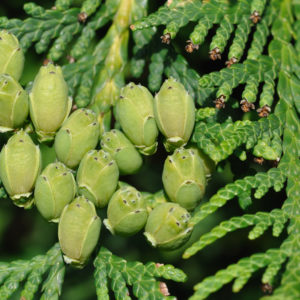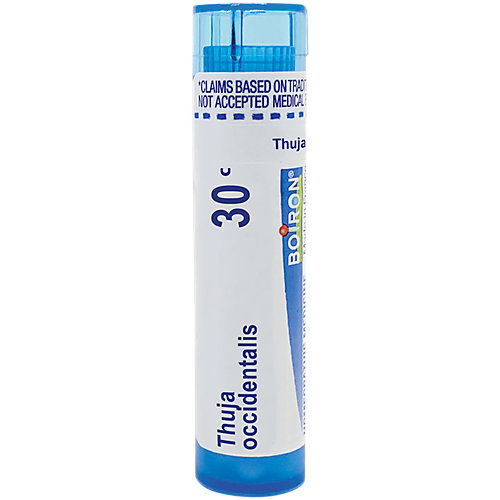Thuja Occidentalis
The Homeopathic Remedy Thuja Occidentalis (Thuj.) works for a variety of health conditions and ailments but is best known to treat skin conditions which include warts, oily skin, dry skin, sensitive or itchy eruptions, nail fungus and hemorrhoids. Thuja is also used for menstrual problems, fevers, coughs, headaches, swollen extremities and other health issues.
Within the world of homeopathy, Thuja is known to be one of the remedies that is recommended to be on hand for a practitioner because of its probable use.
Thuja’s symptomatic relief extends to vicious headaches, headaches from stress or excitement, nausea, gas, constipation, pain after eating, colicky constipation and morning diarrhea, urethral and vaginal infections, excess sweating, tooth decay, and swollen gums
People who require this remedy may be emotional, opinionated, and irritable. Symptoms are better from rubbing and pressure, and worse at night.
Thuja Occidentalis is commonly used for:
Skin Conditions:
Thuja is best known for its ability to treat skin symptoms which include warts, oily skin, dry skin, sensitive or itchy eruptions, nail fungus and hemorrhoids.
The type of warts that Thuja is beneficial for are the type that can be very large and known as “cauliflower warts”. Thuja works to help the body rid itself of the scaly patches that appear, as well as the itchy skin and even brown “age spots” that people tend to complain of.
Menstrual Problems:
Thuja may work as a homeopathic remedy for a number of menstrual problems. When the menstrual periods are scant or too early, or when there is extreme pain over the left ovary specifically, then this is when thuja is recommended.
Urogenital Problems:
Though it is common, it may be hard to detect at first. The urethra is swollen and inflamed with this type of condition, and the urine stream is weak and seems almost split. There is a frequent urge to urinate and infection is prevalent when either a man or a woman suffers from this type of problem. As gonorrhea may be an associated condition, thuja may be given to help with that problem as well.
Headaches:
Not only is the type of headache that thuja may help rather specific, but so too is the type of pain that is suffered. This is a headache that is often caused by stress, exhaustion, or even overexcitement. The pain is piercing and is most likely related to infected sinus or even tooth problems.
Catarrh and Sinusitis:
Individuals who tend to suffer from chronic respiratory or sinus problems may turn to thuja. The catarrh can be foul smelling and is often green or yellow. There is commonly bloody mucus or nasal polyps associated with this type of condition.
Where to buy Thuja Occidentalis
Get Free Shipping on orders over $25 at VitaminShoppe.com!
Thuja Occidentalis’s Personality Profile:
The people that respond well to thuja as a homeopathic remedy tend to be very sensitive, and sensitive to music (weeping with church music), very serious, and often feel that they are not lovable at all.
They put on a good front to the outside world, but they are rather unhappy and negative deep down. They may suffer from serious delusions about their appearance and also from feelings or ideas of paranoia that are hard for them to dismiss. They feel very frail, lack concern for personal appearance or cleanliness and may project a feeling of incompetence or ugliness.
Thuja Occidentalis’s Materia Medica:
Mind: Fixed ideas, as if a strange person were at his side; as if soul and body were separated; as if something alive in abdomen (Croc). Emotional sensitiveness; music causes weeping and trembling.
Head: Pain as if pierced by a nail (Coff; Ign). Neuralgia from tea (Selen). Left-sided headache. White, scaly dandruff; hair dry and falling out. Greasy skin of face.
Eyes: Ciliary neuralgia; iritis. Eyelids agglutinated at night; dry, scaly. Styes and tarsal tumors (Staph). Acute and subacute inflammation of sclera. Sclera raised in patches, and looks bluish-red. Large, flat phlyctenules; indolent. Recurring episcleritis. Chronic scleritis.
Ears: Chronic otitis; discharge purulent. Creaking when swallowing. Polypi.
Nose: Chronic catarrh; thick, green mucus; blood and pus. On blowing nose, pain in teeth. Ulceration within the nostrils. Dryness of nasal cavities. Painful pressure at root.
Mouth: Tip of tongue very painful. White blisters on side close to root, painfully sore. Teeth decay next to gums; very sensitive; gums retract. Drinks fall audibly into stomach. Ranula; varicose veins on tongue and mouth. Pyorrhea alveolaris.
Stomach: Complete loss of appetite. Dislike for fresh meat and potatoes. Rancid eructations after fat food. Cutting pain in epigastrium. Cannot eat onions. Flatulence; pain after food; sinking sensation in epigastrium before food; thirst. Tea-drinking dyspepsia.
Abdomen: Distended; indurations in abdomen. Chronic diarrhœa, worse after breakfast. Discharges forcibly expelled; gurgling sound. Brown spots. Flatulence and distension; protruding here and there. Rumbling and colic. Constipation, with violent rectal pain, causing stool to recede (Sil; Sanic). Piles swollen; pain worse sitting, with stitching, burning pains at the anus. Anus fissured; painful to touch with warts. Movements as of something living (Crocus), without pain.
Urinary: Urethra swollen inflamed. Urinary stream split and small. Sensation of trickling after urinating. Severe cutting after (Sars). Frequent micturition accompanying pains. Desire sudden and urgent, but cannot be controlled. Paralysis sphincter vesicæ.
Male: Inflammation of prepuce and glans; pain in penis. Balanitis. Gonorrhœal rheumatism. Gonorrhœa. Chronic induration of testicles. Pain and burning felt near neck of bladder, with frequent and urgent desire to urinate. Prostatic enlargement (Ferr pic; Thiosinaminum; Iod; Sabal).
Female: Vagina very sensitive (Berb; Kreos; Lyssin). Warty excrescences on vulva and perineum. Profuse leucorrhœa; thick, greenish. Severe pain in left ovary and left inguinal region. Menses scanty, retarded. Polypi; fleshy excrescences. Ovaritis; worse left side, at every menstrual period (Lach). Profuse perspiration before menses.
Respiratory: Dry, hacking cough in afternoon, with pain in pit of stomach. Stitches in chest; worse, cold drinks. Asthma in children (Nat sulph). Papilloma of larynx. Chronic laryngitis.
Extremities: When walking, limbs feel as if made of wood or glass, and would break easily. Tips of fingers swollen, red, feel read. Muscular twitchings, weakness and trembling. Cracking in joints. Pain in heels and tendo-Achilles. Nails brittle. Ingrowing toe nail.
Skin: Polypi, tubercles, warts epithelioma, nævi, carbuncles; ulcers, especially in ano-genital region. Freckles and blotches. Perspiration sweetish, and strong. Dry skin, with brown spots. Zona; herpetic eruptions. Tearing pains in glands. Glandular enlargement. Nails crippled; brittle and soft. Eruptions only on covered parts; worse after scratching. Very sensitive to touch. Coldness of one side. Sarcoma; polypi. Brown spots on hands and arms.
Sleep: Persistent insomnia.
Fever: Chill, beginning in thighs. Sweat only on uncovered parts, or all over except head, when sleeping; profuse, sour, smelling like honey. Orgasm of blood in the evening, with throbbing in the blood-vessels.
Modalities: Worse, at night, from heat of bed; at 3 am and 3 pm; from cold, damp air; after breakfast; fat, coffee; vaccination. Better, left side; while drawing up a limb.



